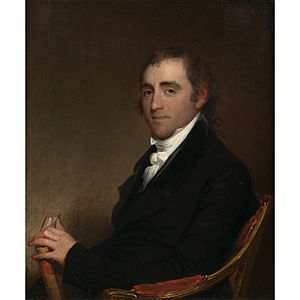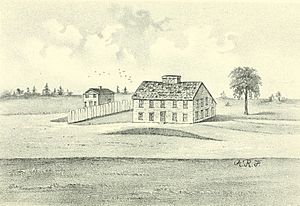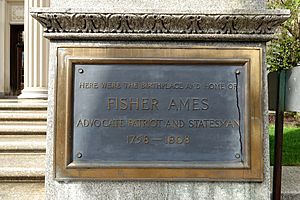Fisher Ames facts for kids
Quick facts for kids
Fisher Ames
|
|
|---|---|
 |
|
| Member of the U.S. House of Representatives from Massachusetts |
|
| In office March 4, 1789 – March 3, 1797 Serving with Samuel Dexter, Benjamin Goodhue, and Samuel Holten (1793-1795)
|
|
| Preceded by | Congress of the Confederation |
| Succeeded by | Harrison Gray Otis |
| Constituency |
|
| Member of the Massachusetts House of Representatives | |
| In office 1788 |
|
| Personal details | |
| Born | April 9, 1758 Dedham, Massachusetts Bay, British America |
| Died | July 4, 1808 (aged 50) Dedham, Massachusetts, United States of America |
| Resting place | Old First Parish Cemetery, Dedham, Massachusetts |
| Political party | Federalist |
| Relatives | Ames family |
| Alma mater | Harvard University |
| Profession | Lawyer |
Fisher Ames (born April 9, 1758 – died July 4, 1808) was an important American politician. He served as a Representative for Massachusetts in the United States Congress. Ames was a key leader of the Federalist Party in the House of Representatives. He was also well-known for his amazing public speaking skills.
Contents
Early Life and Family
Fisher Ames was born in Dedham, which was then part of the Province of Massachusetts Bay. His father, Dr. Nathaniel Ames, passed away when Fisher was only six years old. Despite having little money, his mother, Deborah Fisher, made sure he received a good education.
He came from one of the oldest families in Massachusetts. At six, he began learning Latin. By the age of twelve, he started attending Harvard College. He graduated in 1774 and then worked as a teacher. While teaching, Ames also studied law. He became a lawyer in 1781 and started his own practice in Dedham.
Fisher had a brother named Nathaniel Ames. They had very different political ideas and social styles. Nathaniel enjoyed being a country doctor and supported the common people. He became a leader of the Democratic-Republican Party in Dedham. Fisher, however, liked to dress nicely and spend time with important people in Boston. He was a strong supporter of the Federalist Party. Fisher ran his law business from the first floor of the Ames Tavern.
In 1793, Fisher Ames was chosen as a member of the American Academy of Arts and Sciences. He and his wife, Frances, had six children, including John, Seth, and William. Ames also owned a farm in Dedham that he rented out. When he was home from Washington, he would walk to the farm daily to check on the crops.
Political Career
Serving Massachusetts
In 1788, Fisher Ames became a member of the Massachusetts meeting that approved the United States Constitution. His clear and convincing speeches helped convince enough people to adopt the Constitution. Later that year, he was elected to serve in the Massachusetts House of Representatives.
After leaving Congress, he remained involved in politics. From 1798 to 1800, he was a member of the Governor's Council. In this role, Ames gave a famous speech after the death of President George Washington.
Serving the Nation
Ames was elected to the First United States Congress, winning against Samuel Adams. He was surprised by his victory. He was a member of the Federalist Party. Some believed his success was due to a loose election process.
Ames also served in the Second, Third, and Fourth Congresses. He was a Congressman from March 4, 1789, to March 3, 1797. During the First Congress, he led the Committee on Elections. In 1796, he decided not to run for re-election and returned to practicing law in Dedham.
Even though he was young, Fisher Ames was considered one of the best speakers in Congress. He gave one of the first great speeches in American Congressional history when he spoke in favor of the Jay Treaty. Ames strongly defended the interests of New England. For example, he opposed a tax on molasses. Even with his Federalist beliefs, Ames would disagree with his party if he felt it was not best for the country. For instance, in 1789, he argued against the choice of Thomas Willing to lead the new Bank of the United States.
In 1794, people in Charleston, South Carolina showed their anger towards him. They burned an effigy (a doll-like figure) of him, along with figures of other unpopular people. This was because of his pro-British views.
Political Beliefs
Ames became worried about the growing popularity of Thomas Jefferson's Republicans. They wanted the United States to have a government similar to post-Revolution France. Hamilton's Federalists, including Ames, wanted a stronger national government. They believed it should have powers similar to the British system.
Ames felt that a strong Federalist government, guided by a clear constitution, was the best way to prevent the new nation from failing. He warned against too much democracy without good morals and reason. He believed that democracy alone was too weak to stop a country from becoming a tyranny. He also warned people about leaders who flatter crowds and cause disunity.
Views on Slavery
Fisher Ames was openly against slavery. Both of his parents also opposed it. Ames supported ending slavery in Massachusetts in the early 1780s. He also believed all new independent states should outlaw slavery after the American Revolution. He knew Bunker Hill veterans Peter Salem and Salem Poor, which might have influenced his anti-slavery views.
Later Years
In the late 1700s, Massachusetts was a strong Federalist state. However, Dedham was split between Federalists and Republicans.
Ames returned home to Dedham in 1797. He was concerned by the increasing number of Republicans in town, led by his brother Nathaniel, who lived next door. In 1798, he hosted a Fourth of July party for 60 residents. It included patriotic songs and speeches. The guests wrote a letter to President John Adams, promising their support if the nation went to war with France. They wanted France to know they would not be controlled or pay tribute.
Nathaniel Ames wrote in his diary that his brother had convinced "a few deluded people" to sign the letter. He believed Fisher did this by offering them food and drink. Despite his brother's efforts, Nathaniel thought that "the Great Mass of People" in town supported the Republicans. Fisher wrote to Secretary of State Timothy Pickering that "right opinions" were winning in Dedham over the "most malevolent spirit," the Republican Party. Important Federalists, like Alexander Hamilton, continued to visit him at his Dedham home.
Ames supported Joshua Bates as minister of the First Church and Parish in Dedham. However, Ames later left that church and became an Episcopalian.
During a Town Meeting in Dedham, Ames gave one of his great speeches. After him, a laborer stood up and said, "Mr. Moderator, my brother Ames' eloquence reminds me of nothing but the shining of a firefly, which gives just enough light to show its own insignificance." He then sat down.
In 1805, Ames was chosen to be president of Harvard University. He turned down the offer because his health was failing. Fisher Ames passed away on July 4, 1808. His death was a bother to his brother Nathaniel. Nathaniel had planned a funeral in Dedham. But George Cabot arranged for the funeral to be at his home instead. Nathaniel believed Cabot wanted to embarrass the town of Dedham for its Republican views. Ames was buried in the Old Village Cemetery.
Legacy
Ames Christian University is named after him. The Ames Schoolhouse, which is now Dedham's Town Hall, was also named in his honor.
Even though he served in public office for a limited time, Fisher Ames is considered one of the most important figures of his era. He led the Federalists in the House of Representatives. His support for the Bill of Rights helped gain support for the new Constitution in Massachusetts. He is perhaps most famous for his speaking skills. One historian called him "the most eloquent of the Federalists."
Writings
Ames began his political career by writing essays for local newspapers. He used pen names like Camillus and Lucius Junius Brutus. This made him well-known beyond Dedham. He also published many essays that criticized Thomas Jefferson's followers.
Notable Quotes
- "We have but a slender hold of our virtues; they ought, therefore, to be cherished with care, and practised with diligence."
See also
 In Spanish: Fisher Ames para niños
In Spanish: Fisher Ames para niños
- Ames family
 | Victor J. Glover |
 | Yvonne Cagle |
 | Jeanette Epps |
 | Bernard A. Harris Jr. |



